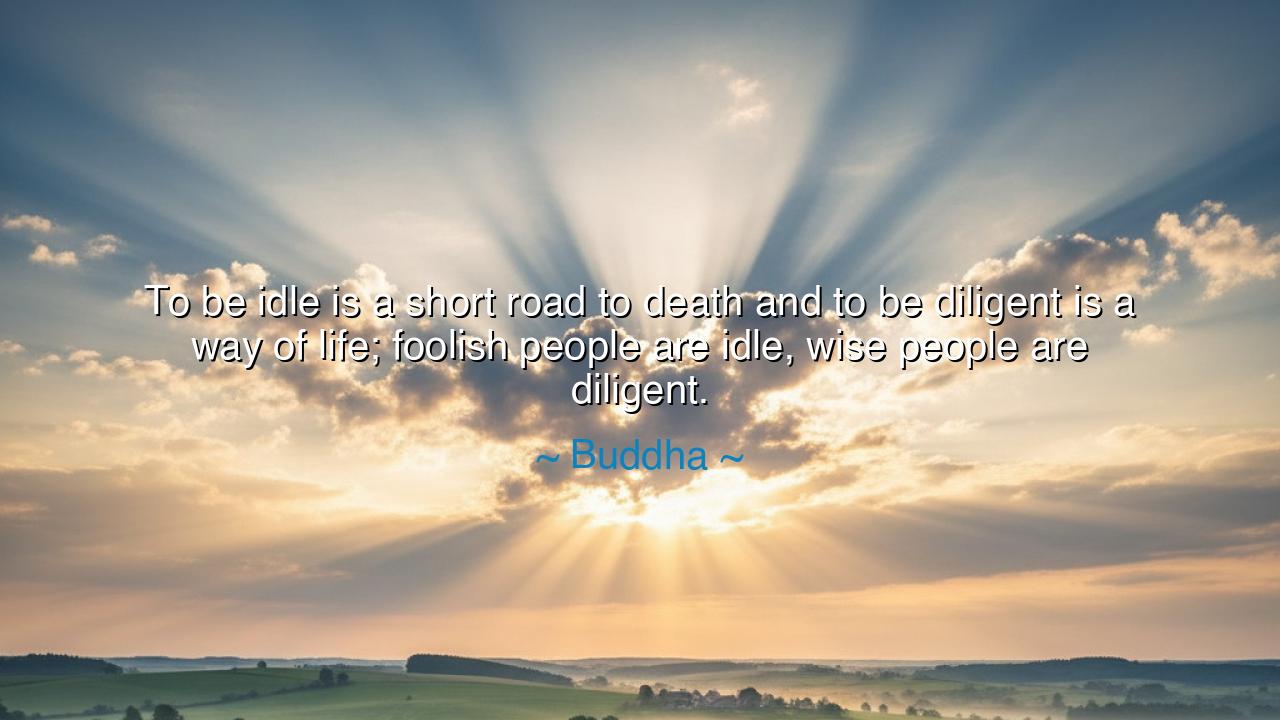
To be idle is a short road to death and to be diligent is a way
To be idle is a short road to death and to be diligent is a way of life; foolish people are idle, wise people are diligent.






The words of the Buddha, “To be idle is a short road to death and to be diligent is a way of life; foolish people are idle, wise people are diligent,” flow from the deep river of ancient truth — a teaching that has guided seekers for more than two thousand years. In this saying, the Enlightened One draws a clear line between stagnation and vitality, between the decay of the spirit and its awakening. For to the Buddha, life is motion, and to live fully is to act with mindfulness, purpose, and compassion. To be idle — to allow the mind and body to drift without aim — is not mere laziness; it is to turn away from life itself. Diligence, by contrast, is the sacred fire that keeps the soul awake.
In the Buddha’s teachings, diligence (appamāda) is one of the highest virtues, often called “the path to immortality.” It is not the feverish activity of greed or ambition, but a steady, conscious effort toward growth, understanding, and right action. Just as a garden left untended becomes overrun with weeds, so too does the mind fall into confusion and decay when left idle. The Buddha saw idleness as a form of spiritual death — not because the body ceases, but because awareness fades, and the flame of wisdom grows dim. The diligent, by contrast, tend their inner garden each day, pulling the weeds of distraction and watering the roots of virtue.
To the ancients, this truth was universal. The sages of Greece, the prophets of Israel, the scholars of China — all understood that idleness weakens the soul. In every great tradition, life is portrayed as a journey, and only the traveler who walks with intent reaches the summit. The idle man, who sits upon the path and waits for ease, will be overtaken by time and regret. But the diligent man, though weary, gains strength through motion. His work becomes his worship; his persistence, his prayer. The Buddha’s teaching, then, is not merely moral but existential — to work, to grow, to remain awake, is to honor the sacredness of being alive.
Consider the story of Thomas Edison, the great inventor. History remembers him not for idle dreams, but for tireless labor. He failed thousands of times before creating the light bulb, and when asked about his failures, he said, “I have not failed. I’ve just found ten thousand ways that won’t work.” His diligence transformed the world. Had he surrendered to idleness, the darkness of defeat would have prevailed. In this, Edison’s life becomes a modern echo of the Buddha’s truth: diligence sustains life, while idleness extinguishes it. For the diligent mind, every challenge is an awakening; for the idle, every obstacle is a tomb.
The Buddha’s warning is not only about physical work, but about the discipline of the mind. The idle mind drifts toward illusion, fear, and craving. It becomes a nest of restlessness, where suffering multiplies. But the diligent mind — trained through meditation, compassion, and mindfulness — becomes clear like a still lake, reflecting the world as it truly is. The Buddha called such diligence the “armor of the wise,” for it protects against despair and ignorance. It is the way of those who seek enlightenment — not by escaping life, but by engaging with it wholly, moment by moment, breath by breath.
And yet, diligence is not harshness. The wise are diligent not because they fear failure, but because they revere life. They understand that every moment is an opportunity to awaken, to create, to love, to serve. The fool wastes his hours in distraction, thinking there is always tomorrow. The wise cherish this hour, knowing that tomorrow is not promised. To be diligent, then, is not to live anxiously, but to live intentionally — to treat each task, no matter how small, as sacred.
So, my listener, take this truth into your heart as a lamp for your path: do not be idle in body or in spirit. Rise each day with purpose, not merely to labor, but to live with awareness. Guard your mind against the poison of complacency. Let diligence be your daily meditation — in your thoughts, in your words, in your deeds. For the idle heart withers, but the diligent one blossoms with every sunrise.
And when your days draw to a close, may you look back not with regret for what was wasted, but with peace — knowing you walked the way of the wise, that your diligence was not toil but transformation. For as the Buddha taught, idleness is death, but diligence is life everlasting — and he who lives with diligence will never truly die.






AAdministratorAdministrator
Welcome, honored guests. Please leave a comment, we will respond soon